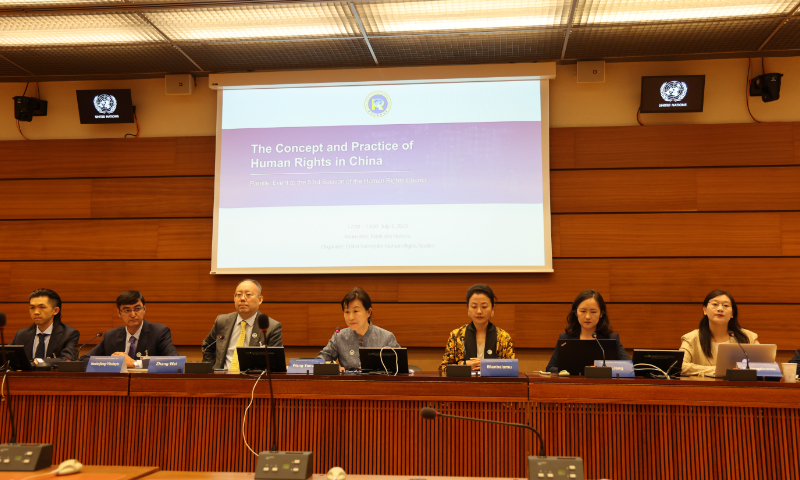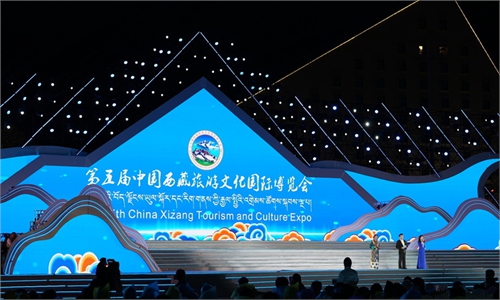
A meeting on the concept and practices of human rights in China is held by the China Society for Human Rights Studies at the Palais des Nations in Geneva on July 3. Photo: Courtesy of Liu Zhonghua
Chinese analysts shared their views on the concept and practices of human rights in China and refuted disinformation spread by anti-China forces in the US and some Western countries on the topics of Tibetan Buddhism's living Buddha reincarnation system and the human rights situation in Xinjiang during a meeting at the 53rd session of the UN Human Rights Council on Monday.
The meeting was held by a Chinese nongovernmental organization, the China Society for Human Rights Studies, at the Palais des Nations on Monday. Seven scholars from China delivered speeches on various topics, including China's path to modernization, China's human rights development, how feminism has been developing in Xinjiang, language protection and development in Xinjiang, and freedom of religion in Xizang.
The event could help to dispel disinformation on China's human rights situation as anti-China forces in the US and the West have not ceased attacking China on its policies in Xizang, Xinjiang and Hong Kong, analysts said.
For example, Nasrjiang Yibulayin, an associate professor at the School of Law and Politics in Kashi University, refuted the "forced labor" lies and said that the purpose of the US and Western powers to fabricate these lies is to use them as a pretext to abuse their long-arm jurisdiction.
They seek to impose sanctions and suppress businesses, creating a narrative of "forced labor" and "forced poverty" in an attempt to keep ethnic groups in Xinjiang "trapped in poverty, isolation, and backwardness, thereby causing turmoil and chaos in the region," said Nasrjiang.
As a witness and builder of the Xinjiang region, Nasrjiang said he had the most right to speak about the truth of the region, adding that the region's tomorrow will be brighter, despite the West's smears.
Topics on China's Xizang region have also been hyped by anti-China forces. At the Monday event, Bianbalamu, a research fellow from the National Institute of International Strategy of the Chinese Academy of Social Sciences, traced the history of the Xizang region becoming an inalienable part of China.
Throughout China's modern history, despite the decline of the ruling classes and the encroachment of European colonizers, successive Chinese governments have consistently exercised sovereignty over the Xizang region, firmly maintaining central authority over the region. However, there are individuals who, driven by ulterior motives, propagate the idea of "Tibetan independence" on the global stage, said Bianbalamu.
Nevertheless, their claims that the Yuan and Qing dynasties represented ethnic rulers who are distinct from the present-day China are entirely baseless. Such assertions reveal their limited understanding of the concepts of a nation and its national sovereignty and suggest their illegitimate political motivations, said the scholar.
Bianbalamu noted that some Western forces who advocate for "Tibetan independence" often overlook the complex development that China, including the Xizang region, has undergone.
They attempt to use the notion of "suzerainty" to challenge China's central authority in the region, promoting the ideas of "national self-determination" and "ethnicity as basis for sovereignty" with the purpose of fooling others and to undermine China's ethnic unity and contain China's growth, said Bianbalamu.
While the reincarnation of Living Buddhas has always been a hot issue hyped by Western anti-China forces and the 14th Dalai Lama clique, Suolangzhuoma, a scholar from the China Tibetology Research Center, also shared her views on the topic.
Suolangzhuoma noted that the system of reincarnation of living Buddhas, as a religious system of Tibetan Buddhism practicing dharma succession, has long been recognized and respected by the state.
The "Measures for the Administration of the Reincarnation of Living Buddhas in Tibetan Buddhism" mark the reincarnation of living Buddhas as part of the rule of law and standardization, which is of great significance for maintaining the normal order of Tibetan Buddhism, protecting the legitimate rights and interests of the Tibetan Buddhist community, and promoting the adaptation of Tibetan Buddhism to socialist society, said Suolangzhuoma.
Over the years, the Central People's Government and the government of Xizang have comprehensively implemented the policy of freedom of religious belief. All religions and sects in Xizang have been equally respected and protected and normal religious activities have been protected in accordance with the law. Citizens' right to freedom of religious belief has also been effectively guaranteed, said the expert.
Considering the development of religions and changes in religious work, and learning from both positive and negative experiences at home and abroad, China has embarked on a road to success that enshrines freedom of religious belief in law, promotes harmonious religious relations, and encourages religious groups to play a positive role, said Suolangzhuoma.


